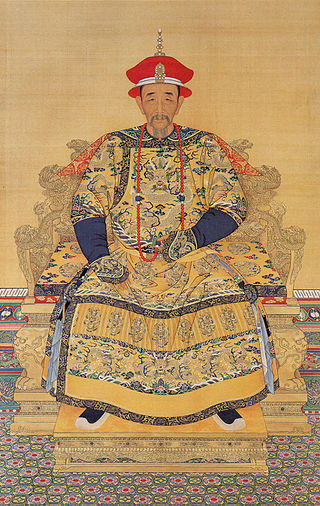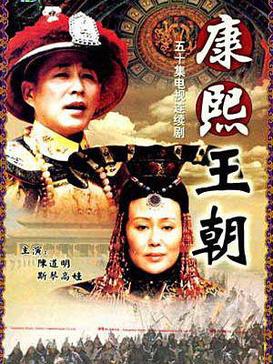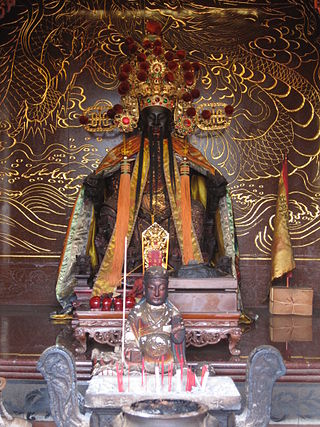| |||||
| Decades: | |||||
|---|---|---|---|---|---|
| See also: | Other events of 1681 History of China • Timeline • Years | ||||
Events from the year 1681 in China .
| |||||
| Decades: | |||||
|---|---|---|---|---|---|
| See also: | Other events of 1681 History of China • Timeline • Years | ||||
Events from the year 1681 in China .

Zheng Chenggong, Prince of Yanping, better known internationally as Koxinga, was a Southern Ming general who resisted the Qing conquest of China in the 17th century, fighting them on China's southeastern coast.

The Kangxi Emperor, also known by his temple name Emperor Shengzu of Qing, personal name Xuanye, was the third emperor of the Qing dynasty, and the second Qing emperor to rule over China proper, reigning from 1661 to 1722. His reign of 61 years makes him the longest-reigning emperor in Chinese history and one of the longest-reigning rulers in history. He is considered one of China's greatest emperors.

The Revolt of the Three Feudatories, also known as the Rebellion of Wu Sangui, was a rebellion lasting from 1673 to 1681 in early Qing dynasty of China, during the early reign of the Kangxi Emperor. The revolt was led by Wu Sangui, Shang Zhixin and Geng Jingzhong, the three Han Chinese lords of Yunnan, Guangdong and Fujian provinces whose hereditary titles were given for defecting and helping the Manchus conquer China, who rebelled after the Qing central government started removing their fiefdoms. The feudatories were supported by Zheng Jing's Kingdom of Tungning in Taiwan, which sent forces to invade Mainland China. Additionally, minor Han military figures, such as Wang Fuchen and the Chahar Mongols, also revolted against Qing rule.

Kangxi Dynasty is a 2001 Chinese television series based on the novel Kangxi Da Di by Eryue He. The series is a prequel to the 1997 television series Yongzheng Dynasty, and was followed by Qianlong Dynasty in 2002.

Zheng Jing, Prince of Yanping, courtesy names Xianzhi and Yuanzhi, pseudonym Shitian, was initially a Southern Ming military general who later became the second ruler of the Tungning Kingdom of Taiwan by succeeding his father Koxinga's hereditary title of "Prince of Yanping", reigned as a dynastic monarch of the kingdom from 1662 to 1681.

The Kingdom of Tungning, also known as Tywan by the British at the time, was a dynastic maritime state that ruled part of southwestern Taiwan and the Penghu islands between 1661 and 1683. It is the first predominantly ethnic Han state in Taiwanese history. At its zenith, the kingdom's maritime power dominated varying extents of coastal regions of southeastern China and controlled the major sea lanes across both China Seas, and its vast trade network stretched from Japan to Southeast Asia.

Zheng Keshuang, Prince of Yanping, courtesy name Shihong, art name Huitang, was the third and last ruler of the Kingdom of Tungning in Taiwan in the 17th century. He was the second son of Zheng Jing and a grandson of Koxinga. After surrendering to the Qing dynasty in 1683, he was ennobled as Duke of Hanjun (漢軍公), and lived the rest of his life in Beijing.

Zhu Shugui, courtesy name Tianqiu (天球) and art name Yiyuanzi (一元子), the Prince of Ningjing (寧靖王), was a royal member of the Ming and the last of the pretenders to the throne of Southern Ming after the execution of the Yongli Emperor in 1662. He took shelter to the Kingdom of Tungning in Taiwan after mainland China completely fell under the control of Manchu-led Qing dynasty. Despite his status as a royal member, he virtually shared no political power with the Zheng dynasts whom were the actual rulers of the kingdom. After the Qing forces successfully annexed Taiwan in 1683, he committed suicide. Nowadays there is a temple dedicated to the prince in Lujhu Township. Inside the temple is written Zhu's death poem.
Feng Xifan was a Chinese official who initially served in the Kingdom of Tungning in Taiwan before he surrendered to the Qing dynasty.

Zhu Yihai, courtesy name Juchuan (巨川), art name Hengshan (恆山) and Changshizi (常石子), was a regent of the Southern Ming dynasty from 1645 to 1653.

Queen Dong, birth name Dong You, posthumous name Chaowu Wangfei, was the princess consort of Koxinga and mother of Zheng Jing.
Zheng Kezang (1662–1681), birth name Qin (欽) or Qinshe (欽舍), was the crown prince and regency of the Kingdom of Tungning. Kezhang was the eldest son of Zheng Jing and Chen Zhaoniang, and his grandparents were Koxinga and Princess Dong.
Events from the year 1662 in China.
Events from the year 1663 in China. Also known as 壬寅 4359 or 4299 to 卯年 4360 or 4300 in the Earthly Branches calendar.
Events from the year 1674 in China.
Events from the year 1680 in China.
Events from the year 1683 in China.

Liu Guoxuan (1628–1693) was the Wuping Marquis and a 17th-century military officer of the Kingdom of Tungning based in Taiwan. He fought all over the island of Taiwan and the nearby mainland. He also commanded the Penghu defense during the Battle of Penghu.

Chen Yonghua, courtesy name Fufu ), was a prominent official of the Kingdom of Tungning in Taiwan in the late 17th century. He was from the region near modern-day Quanzhou.